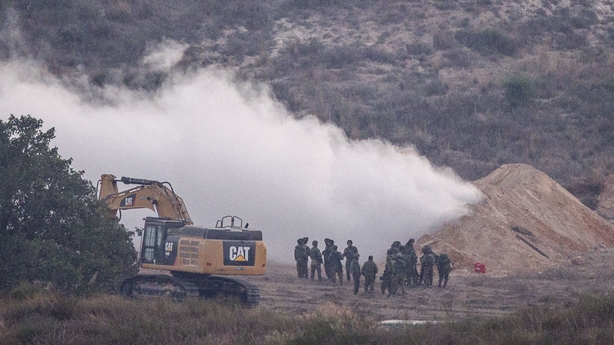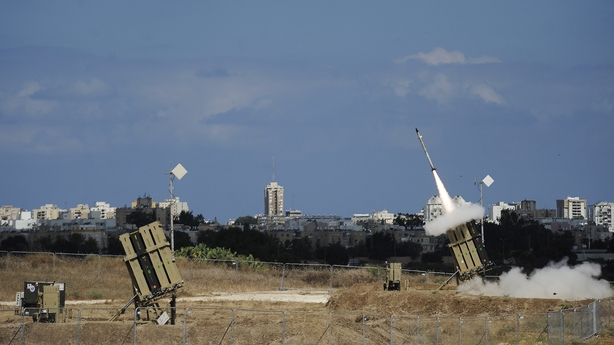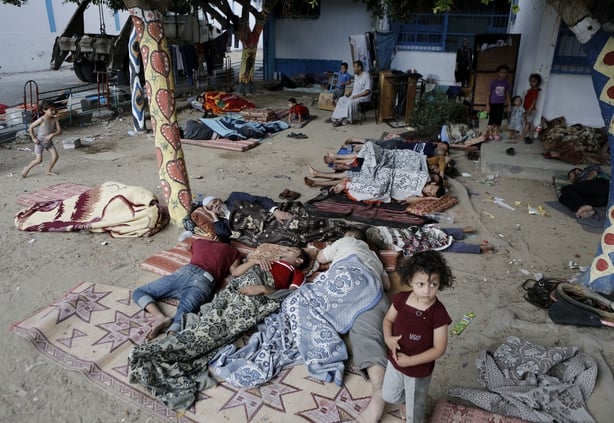 Tuesday 29 July 2014 16.33
Tuesday 29 July 2014 16.33 The only power plant supplying electricity to Gaza was knocked out of commission, as part of 70 attacks on Gaza reportedly carried out by the Israeli military overnight.
"Gaza's sole power plant has stopped working due to Israeli shelling last night, which damaged the steam generator and later hit the fuel tanks which set them on fire," said Fathi al-Sheikh Khalil, the deputy director of the energy authority in the Palestinian territory.
The house of a Hamas leader and another on the group's radio and television headquarters were also damaged by Israeli shelling.
Israel's military has pounded targets in Gaza after Prime Minister Benjamin Netanyahu said his country needed to be prepared for a long conflict in the Palestinian enclave.
Medics have said that at least 13 Palestinians were killed after houses in Jabaliya in northern Gaza were hit by tank shelling.
Earlier, Israeli aircraft fired a missile at the house of Hamas Gaza leader Ismail Haniyeh before dawn, causing damage but no casualties, Gaza's interior ministry said.
An Israeli military spokeswoman had no information on the report but was checking for details.
Eleven people were killed in a strike on a house in the Bureij refugee camp in Gaza City as Israeli forces hit targets across the territory in the most widespread night of attacks so far.
The military said five soldiers had died in a gun battle with militants who crossed into Israel via a tunnel near the community of Nahal Oz, close to the border with Gaza.
The incident yesterday raised to ten the number of military fatalities for the day.
Fifty-three Israeli soldiers have been killed since Israel launched its offensive on Gaza.
Hamas said that its broadcast outlets, Al-Aqsa TV and Al-Aqsa Radio, were also targeted. The television station continued to broadcast, but the radio station went silent.
Israel began its offensive on 8 July with the aim of halting rocket attacks by Hamas and its allies.
Timeline: Operation Protective Edge
 It later ordered a land invasion to find and destroy the warren of Hamas tunnels that criss-crosses the border area.
It later ordered a land invasion to find and destroy the warren of Hamas tunnels that criss-crosses the border area.
In a televised address on Monday night, a grim-faced Mr Netanyahu said any solution to the crisis would require the demilitarisation of the Palestinian territory, controlled by Hamas Islamists and their militant allies.
"We will not finish the mission, we will not finish the operation without neutralising the tunnels, which have the sole purpose of destroying our citizens, killing our children," Mr Netanyahu said, adding that it had been a "painful day".
An opinion poll broadcast by Israel's Channel 10 television showed overwhelming public support for continuing the Gaza offensive until Hamas is "disarmed".
As night fell, army flares illuminated the sky and the sound of intense shelling was heard.
The military warned thousands of Palestinians to flee their homes around Gaza City, which is usually the prelude to major army strikes.
"We need to be prepared for a protracted campaign. We will continue to act with force and discretion until our mission is accomplished," Mr Netanyahu said.
A number of rockets fired from Gaza were launched toward southern and central Israel, including the Tel Aviv area.
 At least one rocket was intercepted by the Iron Dome system. No casualties or damage were reported.
At least one rocket was intercepted by the Iron Dome system. No casualties or damage were reported.
So far, 1,100 Gazans, most of them civilians, have died in the 22 days of fighting.
As well as the 53 soldiers killed, three Israeli civilians have died as a result of Palestinian shelling.
The explosion of violence, after a day of relative calm on Sunday, appeared to wreck international hopes of turning a brief lull into a longer-term ceasefire.
Gaza's dominant Hamas Islamists said they had accepted a UN call for a pause in hostilities yesterday to coincide with Eid, which marks the end of the fasting month of Ramadan.
Israel initially baulked, having abandoned its own offer to extend a 12-hour truce from Saturday when Palestinian rockets kept flying.
Calm gradually descended through the night with the occasional exchange of fire until a series of blasts shook Gaza in the afternoon.
Foreign pressure has been building on Mr Netanyahu to restrain his forces.
Both US President Barack Obama and the UN Security Council called for an immediate ceasefire to allow relief to reach Gaza's 1.8 million Palestinians, followed by negotiations on a more durable cessation of hostilities.
Israel wants guarantees Hamas will be stripped of its tunnels and rocket stocks.
It worries the Palestinian Islamists will engineer the truce talks mediated by their allies in Qatar and Turkey into an easing of an Israeli-Egypt blockade on Gaza.
In his television address, Mr Netanyahu said any solution to the crisis would need to see Hamas stripped of its weapons.
"The process of preventing the armament of the terror organisation and demilitarisation of the Gaza Strip must be part of any solution. And the international community must demand this forcefully," he said.
Hamas said its forces had infiltrated Israel to retaliate for the killing of children in a beach camp.
Tension between Mr Netanyahu's government and the US has flared over US mediation efforts, adding another chapter to the prickly relations between the Israeli leader and US President Barack Obama.
US-led negotiations over 20 years have brokered no permanent peace deal.
The most recent round collapsed in April, with Palestinians livid over Jewish settlement building in the occupied West Bank and Israelis furious that Western-backed Palestinian President Mahmoud Abbas had signed a unity pact with Hamas.
Qatari Foreign Minister Khaled Al-Atteya said Israel had not respected a ceasefire agreement brokered by Egypt that ended the last Gaza war in 2012 and it was time the blockade, which is also enforced by neighbouring Egypt, was lifted.
Israel has signalled it wants a de-facto halt to fighting rather than an agreement that would preserve Hamas's arsenals and shore up its status by improving Gaza's crippled economy.

The main UN agency in Gaza, UNRWA, said more than 167,000 displaced Palestinians had taken shelter in its schools and buildings, following calls by Israel for civilians to evacuate whole neighbourhoods ahead of military operations.
"His threats do not frighten either Hamas or the Palestinian people, and the (Israeli) occupation will pay the price for its massacres against children and civilians," Hamas spokesman Sami Abu Zuhri told Reuters.
In New York, UN Secretary-General Ban Ki-moon deplored what he said was a lack of resolve among all parties.
"It's a matter of their political will. They have to show their humanity as leaders, both Israeli and Palestinian," he told reporters.
Concern for safety of children
UNICEF's Head of Child Protection has said there is no place in Gaza that is safe for children at the moment.
Speaking on RTÉ's Morning Ireland, Bruce Grant said the conflict over the past few weeks had played out on women and children more so than anyone else.
He said that for every one militant that had been killed at least two children had been killed.
Mr Grant was speaking following the deaths of eight children and two adults in an explosion in a playground in the north of Gaza yesterday.
He said that as soon as the security situation allowed, UNICEF teams would try to work out how the children died.
Mr Grant said UNICEF had sent more than 100,000 text messages to people in Gaza with some basic child protection advice, including that parents should try to keep children inside and to make sure there was an evacuation plan in place.
However, he acknowledged that homes in Gaza were not safe from the violence.
Anda sedang membaca artikel tentang
Gaza's sole power plant down after Israel attack
Dengan url
http://newsdeadlineup.blogspot.com/2014/07/gazas-sole-power-plant-down-after.html
Anda boleh menyebar luaskannya atau mengcopy paste-nya
Gaza's sole power plant down after Israel attack
namun jangan lupa untuk meletakkan link
Gaza's sole power plant down after Israel attack
sebagai sumbernya
0 komentar:
Posting Komentar